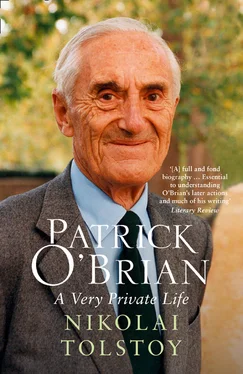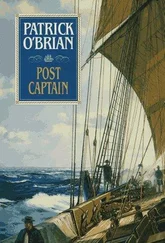The nature of her crime and the harshness of the punishment remain undisclosed. Two aspects are, however, clear. In the first place, Patrick was confessedly in an exceptional state of tension. Secondly, this was almost certainly the sole occasion on which the faithful Buddug was ever ‘whipped’. Not only is there no record in my mother’s diary of such an occurrence at any other time, but I am confident she would not have permitted it. It was surely this uncharacteristic episode that inspired Patrick’s awkwardly obtruded account of Xavier’s sadistic treatment of his dog. Patrick was deeply ashamed of having lost his temper with Buddug, and inserted the passage in his novel as a further form of exorcism or self-castigation.[fn19]
Finally, on this significant topic, there remains Patrick’s passing allusion to the formal act of confession, which Xavier finds inadequately emollient when he repairs to the town curé, Father Sabatier. What he required was not a bland rite of forgiveness, but surgical exposure and extraction of the moral cancer of which his conscience accused him.
In 1960 he and my mother spent several months in London, coming every day to see me in hospital, where I was confined after a severe back operation. Despite the bitter circumstances of her divorce, my mother remained throughout her life deeply attached to the Russian Orthodox Church, in which she had married my father, and my sister and I were baptized. During this time she and Patrick became regular attenders at our Russian church in Emperor’s Gate, where they came to know and admire the parish priest. Father George Sheremetiev was a remarkable figure. Head of one of Russia’s greatest aristocratic families, he had previously been a cavalry officer in the Imperial Army. More importantly, he possessed a truly noble character: wise, perceptive, and holy in the truest sense. I regularly confessed to him, and like his other parishioners invariably found his admonitions perceptive and inspiring.
So impressed were my parents by Father George, that they asked him to marry them – their civil union of 1945 being unrecognized by the Church. Since Patrick would have appreciated from my mother how beneficial was the rite, it seems possible that he himself engaged in confession at this time – perhaps of an informal character. In the Aubrey–Maturin novels, Stephen Maturin is consistently portrayed as a Laodicean Catholic, verging on deism. However, after a particularly sumptuous dinner at Ashgrove Cottage, he congratulates Mrs Aubrey, adding jocularly: ‘When next I see Father George I shall have to admit to the sin of greed …’[11] That Maturin had a confessor at all comes to the reader as a surprise, and that the latter bore so apparently English a name seems further anomalous (one would expect him to have been Irish or Catalan). On the one hand, we never read of Maturin’s participation in a Catholic service, while on the other numerous instances attest to Patrick’s pleasure in assigning the names of his acquaintances to characters in his books. Is this what happened here? Did Patrick eventually make the confession he had sought to express through his early novels?
I have dealt with the confessional element in The Catalans at some length, as it would be dangerously easy in the absence of knowledge of Patrick’s emotional state of mind to take Xavier’s rant against his son Dédé as a reflection of his own attitude towards his son Richard.[12] In fact, given the warmth of their relationship at the time of writing, such an assumption appears wholly implaus ible. Furthermore, even had Patrick perversely decided to blackguard his own son in print, my mother would have registered the strongest objection. She loved the boy almost as much as she did his father. In December 1952, she wrote fondly: ‘Horrid letter from Mrs. Power [Elizabeth] about poor R., & letter from the school … Started V necked jersey for R. One of school complaints is that he wears my jersey, & Mrs P says he has lived in it since he got it. Cannot help feeling pleased.’
The year 1952 ended on a note of cautious optimism. My parents entertained high hopes for the success of The Catalans in the USA, and with luck in Britain too. Contemplating his next project, Patrick returned to notes he had compiled in the British Museum before the War for his planned book on medieval bestiaries. Hitherto the scheme had barely left the drawing board, but now as Christmas approached he completed a 10,000-word draft, which he planned to send with a synopsis of the remainder to his US and British publishers. In the event, it seems that their newly gained wealth allowed pleasurable distractions to interrupt the work sufficiently long for it to be abandoned permanently. It is a pity the draft has not survived, since his notes and provisional chapters in my possession indicate that Patrick could have produced an entertaining work on the subject.
All this is, however, to anticipate the book’s publication. It would be a year at least before The Catalans appeared in print, and what was to be done during the agonizing months of anticipation that lay ahead? Christmas drew near, with nothing happening as it should. On 19 December my mother was dismayed to find they had spent that year more than 60,000 francs on entertainment alone. The 22 of December proved worse: it was the ‘Black Day’, when they learned that the New Yorker had after all turned down the collection of stories submitted with such high hopes six weeks earlier. On Christmas Eve they received Richard’s school report: it likewise proved damning, provoking further depression. Christmas cards arrived, including one from Patrick’s stepmother Zoe, of whom he was very fond, and kind neighbours called with gifts. The festival was quietly enjoyed, but they decided they could not afford to give each other the customary presents.
Although the need for economy was pressing, they had managed to amass sufficient funds five days after Christmas to purchase for 100,000 francs a Citroën 2CV, popularly known as a ‘ deux chevaux ’. This was in due course to prove an even greater asset than the alternative prospect of an Andorran bolt-hole, which they now found themselves reluctantly obliged to abandon.
III III New Home and New Family IV Voyages of Adventure V In the Doldrums VI A Family Man VII Master and Commander VIII The Green Isle Calls IX Pablo Ruiz Picasso X Shifting Currents XI Muddied Waters XII Travails of Existence XIII Family Travails XIV The Sunlit Uplands XV Epinician Acclaims XVI Triumph and Tragedy XVII Melmoth the Wanderer Envoi Appendix A: Collioure: History and Landscape Appendix B: Patrick and His First Wife Elizabeth Appendix C: Patrick’s Sailing Footnotes Notes Index Acknowledgements About the Author Also by Nikolai Tolstoy About the Publisher
New Home and New Family III New Home and New Family IV Voyages of Adventure V In the Doldrums VI A Family Man VII Master and Commander VIII The Green Isle Calls IX Pablo Ruiz Picasso X Shifting Currents XI Muddied Waters XII Travails of Existence XIII Family Travails XIV The Sunlit Uplands XV Epinician Acclaims XVI Triumph and Tragedy XVII Melmoth the Wanderer Envoi Appendix A: Collioure: History and Landscape Appendix B: Patrick and His First Wife Elizabeth Appendix C: Patrick’s Sailing Footnotes Notes Index Acknowledgements About the Author Also by Nikolai Tolstoy About the Publisher
I descended a little on the Side of that delicious Valley, surveying it with a secret kind of Pleasure (though mix’d with other afflicting Thoughts) to think that this was all my own, that I was King and Lord of all this Country indefeasibly, and that I had a Right of Possession; and if I could convey it I might have it in Inheritance, as completely as any Lord of a Manor in England.
Читать дальше












